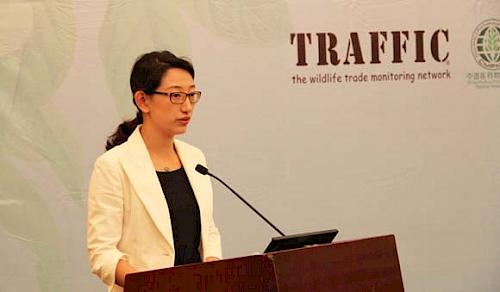Traditional Chinese medicine industry holds CSR & sustainable development forum
Hangzhou, Zhejiang, China, 24th April 2015—a Corporate Social Responsibility (CSR) and Sustainability Forum for the Traditional Chinese Medicine (TCM) took place earlier this month in Hangzhou, Zhejiang Province.

The meeting offered the opportunity to review progress with implementing commitments made by companies at the inaugural TCM CSR and sustainability forum in 2014.
The event was funded by the European Union-China Environmental Governance Programme (EGP) project, and co-sponsored by TRAFFIC, the World Federation of Chinese Medicine Societies (WFCMS), Wecome Pharmaceutical Ltd, China Medical Pharmaceutical Material Association (CMPMA), International Trade Union of Genuine Regional Materia Medica (TUGRMM) and WWF.
Over 60 participants from across China ranging from government agencies, private sector companies, academia and NGOs attended, including 40 traditional Chinese medicine (TCM) companies. Most of the participants and companies were present at the inaugural forum in 2014.
The meeting focused on supply chain management and the implementation of applicable standards and best practices (in particular the FairWild Standard for sustainable wild collection).
An analysis of legislation relevant to sustainability and sourcing of TCM plant ingredients was presented, together with draft industry CSR guidelines that have been developed—the first of their kind for China’s TCM industry.
There was also an opportunity to share best-practice case studies from China and elsewhere, including one from China’s Shaanxi Province China and another from Bac Kan Province in Viet Nam, and an opportunity to showcase the market potential of wild-collected sustainably produced ingredients from China.
Another Forum highlight were preliminary policy recommendations for sustainable development within the TCM industry and sustainable management of TCM species. The recommendations include requests to develop legislation covering conservation of wild medicinal plants and their sustainable use and an official inventory of nationally important medicinal plants resources, together with priority species management plans. The recommendations also include piloting of sustainable wild-collection models, including of the FairWild Standard and certification scheme, strengthening wild resource property rights, assessment and monitoring of conservation performance and collaboration between relevant agencies.
Wecome Pharmaceutical Ltd spoke about their development of a long-term CSR strategy, while TRAFFIC used the opportunity provided by the Forum to release preliminary results of an international market study on sustainably certified Chinese medicinal plants, carried out jointly with the International Trade Centre (ITC).
“There is an extensive and growing international market for sustainably certified products from China, including in the US and EU,” said Anastasiya Timoshyna, TRAFFIC’s Medicinal Plants Programme Leader.
“This creates enabling conditions for implementation of the FairWild Standard that can help support wild plant populations, the livelihoods of collectors and the overall competitiveness of China’s medicinal plant industry.”
Mr Yang Rongchen, Deputy General Director of the State Administration for TCM, encouraged companies participating in the meeting to follow the CSR roadmap and contribute towards China’s TCM Strategic Development Planning work. He also emphasized the importance of co-operation between government agencies, especially with the State Forestry Administration (SFA).
“The SFA and the State Administration for TCM are co-operating over the use of TCM materials, which has benefits both for sustainable use of medicinal plants and for forest protection,” he said.
TRAFFIC’s Regional Director for East & South Asia, Dr Yannick Kuehl, noted that developing and implementing CSR strategies can help build up ethical sourcing practices, encourage sustainable production and promote fair trade.
“The sustainability criteria and FairWild principles can provide technical support for a company’s CSR strategy through improving supply chain management, increasing added value, and helping build sustainable business development in the long run,” he said.
“Development of CSR guidelines by the TCM industry in China is a vital and welcome initiative,” he said.
 This communication has been produced with the financial assistance of the European Union. The contents of this communication are the sole responsibility of TRAFFIC and can under no circumstances be regarded as reflecting the position of the European Union.
This communication has been produced with the financial assistance of the European Union. The contents of this communication are the sole responsibility of TRAFFIC and can under no circumstances be regarded as reflecting the position of the European Union.



